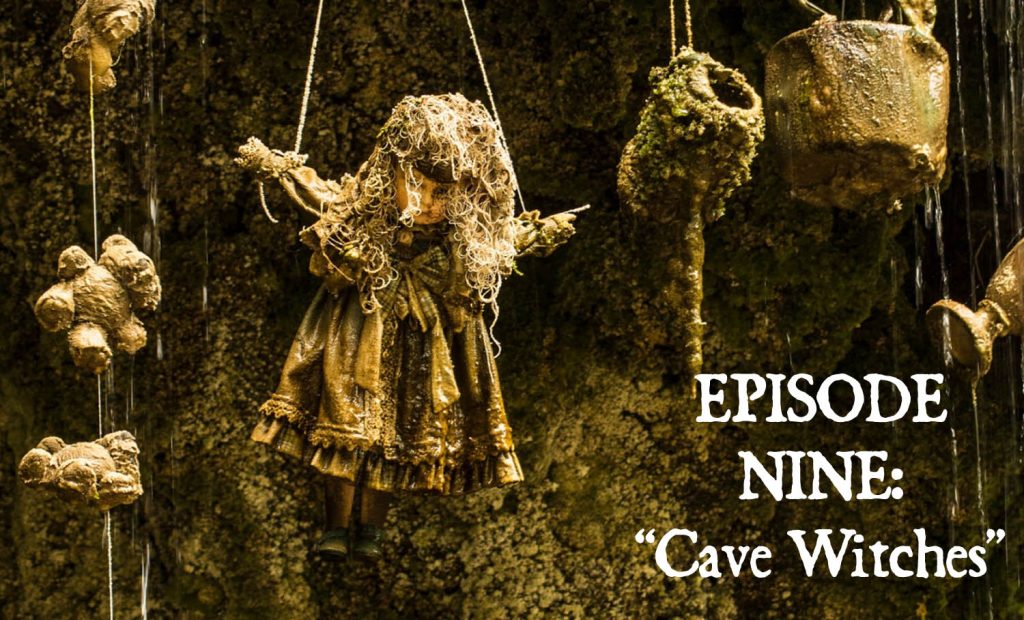Podcast: Play in new window | Download (Duration: 36:22 — 66.6MB)
Subscribe: Apple Podcasts | Spotify | Android | Podchaser | RSS | More
In this episode of Bone and Sickle, we’re looking at the folklore and history of witches associated with caves. We begin with the Bell Witch, of Adams Tennessee and a quick audio montage saluting the creature, one based around the eccentric country-western song “The Bell Witch” by Merle Kilgore. Also included are snippets of The Bell Witch, The Movie, The Bell Witch Featurette, The Bell Witch Haunting, Cursed: The Bell Witch “reality” show on A&E, and a bit of Zak Bagans of Ghost Adventures scaring himself in the Bell Witch cave. Just so you know, there is also a Bell Witch ballet. It’s a love story.
I neglected to mention the source for the original Bell Witch legend. It is An Authenticated History of the Famous Bell Witch, published in 1894 by the newspaper editor Marvin V. Ingram. His source was allegedly a diary kept by John Bell, the primary target of the witch’s animosity, though the existence of this diary has never been independently confirmed.
Next we visit the cave of the 16th-century seer Mother Shipton in Knaresborough, England. Wilkinson provides a dramatic reading of an account of her birth from a 1687 volume, and we learn about the curious wishing well attached to Shipton’s Cave, a geological oddity known for “petrifying” objects hung in its waters, some of which are available through the site’s gift shop. You can read more of the prophecies attributed to Shipton here.
Next we visit the town of Zugarramurdi in northeastern Spain’s Basque region, known for its “Cave of the Witches,” featured in the 2013 horror-comedy The Witches of Zugarramurdi, released to English-speaking audiences as Witching and Bitching. We learn of the world’s largest witchcraft investigation that took place in this town and something of the Basque folklore that may have given the inquisitors their idea of the Devil. The song “Baba Biga Higa,” a Basque witches’ rhyme set to music by Mikel Laboa, is featured as well as music by the Basque folk group Kepa Junkera & Sorginak.
Then it’s off to Italy to learn about the Sibyls, seers rooted in classical mythology and associated with caves. Our first stop is in central Italy’s Appennine mountains where the Sybils of ancient Greece and Rome was transformed into a sort of fairy, occupying an vast underworld entered through a cave on Mount Sibilla. Nearby is the town of Norcia and the Lake of (Pontius) PIlate, sites famous int he Middle Ages for witchcraft. Our story extends a bit to Germany as we learn that the Appenine legend was borrowed into German culture and associated with the minnesinger and knight Tannhauser, whose story was taken up by Richard Wagner in his opera Tannhäuser. in the background of this segment we hear an excerpt from this opera related to the Appenine legend.
The second Sibyl, associated with a cave near Naples, is the Cumaen Sibyl featured in a story about some hard bargaining over her books of prophecy with the last king of Rome and another about the problem with wishing for eternal life. The Cumaen Sibyl’s cave, described as an entrance to the Underworld by Virgil in his Aeneid, is also near a sinister body of water, Lake Avernus, whose mephitic atmosphere is more than a little harmful to certain mortal creatures who venture too close. There’s also a mention of a rather obscure novel Mary Shelley attempted as a follow-up to her success with Frankenstein. Yes, it also relates to the Cumaen Sibyl and her cave.
We close the show examining the strange way the prophecies of the pagan Sibyl intertwined with church teachings, and through this weird nexus ended up echoed in the soundtracks to certain horror films.

